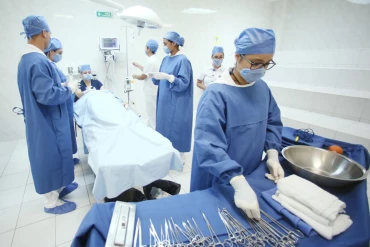I Experienced Bowel Damage During a Hysterectomy. Was It Malpractice?

Hysterectomy is an incredibly common surgical procedure, and around a third of all women can expect to have a hysterectomy by the time they turn 60. Most of the 600,000 hysterectomies performed in America each year are done without issues or complications, but the consequences can be disastrous when something does go wrong.
What Is a Hysterectomy?
Hysterectomy is a type of surgery in which all or part of a woman’s uterus is removed. Sometimes other surrounding organs are also removed, such as the ovaries, cervix, or fallopian tubes. This procedure may be performed for various reasons, including as a treatment for uterine fibroids, endometriosis, or cancer.
How Does Bowel Damage Occur During a Hysterectomy?
Bowel injuries are rare but serious potential complications of any hysterectomy procedure. Due to the close anatomy of organs in the pelvic area, it’s quite easy for a surgeon (particularly if they’re inexperienced) to accidentally nick the small or large intestine when removing the uterus or surrounding organs. This risk goes up in patients with a history of prior abdominal surgery or distortion of the pelvic anatomy caused by things like endometriosis, tumors, or large fibroids.
It’s estimated that some type of bowel injury occurs in around 1 percent of all hysterectomy procedures, but most injuries are noticed and repaired during the surgery itself. When the large or small intestine is cut or damaged during a hysterectomy, and the injury goes unnoticed, or when a repair is poorly done, the intestine may begin to leak. When that happens, bacteria and fecal matter can drain out of the bowels, which can cause serious infections to form within the abdominal cavity.
What Are the Consequences of a Bowel Injury During Hysterectomy?
When the intestines are injured during a hysterectomy procedure and properly repaired before the procedure is completed, most people recover completely without any further complications. However, if the mistake goes unnoticed or the repair is done poorly, the results can be catastrophic. Early symptoms of a cut or nicked bowel after a hysterectomy include intense abdominal pain, fever, chills, nausea, and bloated abdomen. Unfortunately, some doctors will dismiss these symptoms as “normal” post-op pain and ignore their patients’ complaints until the infection has taken hold.
When bowel contents are permitted to leak into the abdominal cavity, infections can be deadly. The longer an infection goes unchecked, the harder it is to stop. Sepsis becomes likely when the infection becomes too intense or enters the bloodstream. When septic shock sets in, the body’s organs fail, and blood pressure drops dangerously low. When infections are allowed to get this severe, the body begins to shut down “non-essential” blood vessels in the arms and legs to keep blood flowing to the brain and heart. When this happens, it’s not unusual for fingers, toes, or even entire limbs to require amputation. In the worst instances, infections from bowel injuries can quickly turn deadly.
My Surgeon Damaged My Bowels During a Hysterectomy. Is It Malpractice?
Unfortunately, surgeries like hysterectomies always come with risks. Bowel injury is one of the possibilities, but that doesn’t mean that every doctor who nicks a nearby organ during surgery is guilty of malpractice. To prove that a doctor was negligent in their care, you must prove that an average, competent doctor would have acted differently in the same situation. Perhaps your doctor overlooked an injury they caused when it should have been obvious. Maybe they didn’t follow the proper procedures for repairing the wound they made, or they ignored your complaints when you knew something was wrong.
You would deserve compensation if your doctor’s negligence contributed to a severe bowel injury during your hysterectomy. Medical malpractice can often be challenging to prove, so hire a lawyer with experience winning these types of cases. Pennsylvania has a two-year statute of limitations on malpractice cases, and it can take time to build a strong case, so don’t delay.
Why Choose Ross Feller Casey?
When you’ve been injured by a doctor’s negligence, trying to decide on the next step can be overwhelming. Survivors often have a long recovery process, and you may be struggling to pay for basic necessities due to lost wages and the crushing burden of medical bills from an extended hospital stay. The legal team at Ross Feller Casey understands that making it through a situation like this is no easy feat, and we’ll do everything we can to make the process easier on you.
Our team has recovered over $1 billion dollars for our clients in the past five years alone, and we’re ready to put that experience to work for you. Unless you win, there’s no fee, so contact us today for a free case review.
Disclaimer: Ross Feller Casey, LLP provides legal advice only after an attorney-client relationship is formed. Our website is an introduction to the firm and does not create a relationship between our attorneys and clients. An attorney-client relationship is formed only after a written agreement is signed by the client and the firm. Because every case is unique, the description of awards and summary of cases successfully handled are not intended to imply or guarantee that same success in other cases. Ross Feller Casey, LLP represents catastrophically injured persons and their families in injury and wrongful death cases, providing legal representation in Pennsylvania and New Jersey.





